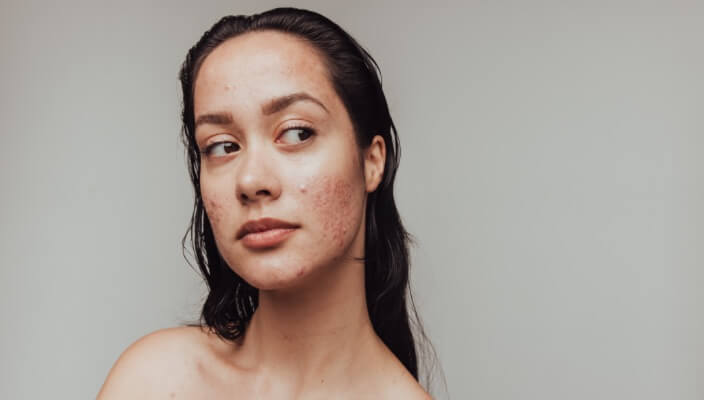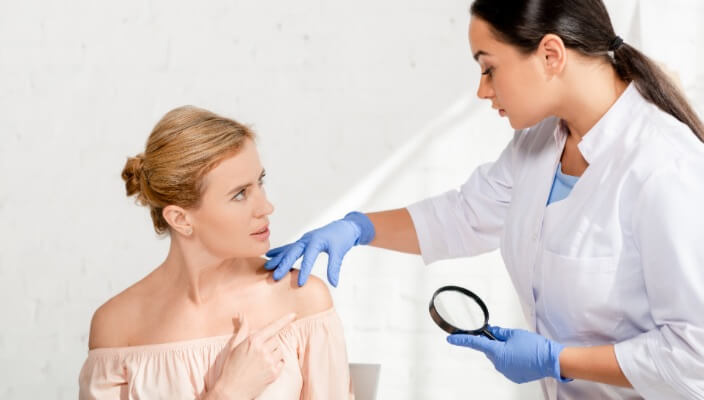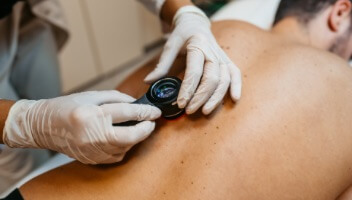Most Common Skin Lesions: Removal Methods and Prevention Tips
Common Types of Skin Lesions
 Our skin experts come across skin lesions on a daily basis. Whether it’s a painful cyst, atypical mole, unusual patch of skin, or another type of growth, we’re experienced in diagnosing and removing them to restore our patient’s healthy skin.
Our skin experts come across skin lesions on a daily basis. Whether it’s a painful cyst, atypical mole, unusual patch of skin, or another type of growth, we’re experienced in diagnosing and removing them to restore our patient’s healthy skin. Learn more about the most common types of skin lesions we see and how our dermatologists remove them.
Moles
Most people have at least a few moles on their body. Also known as a melanocytic nevus or simply a nevus, moles are usually round, brown or pink macules, papules, or nodules. They are incredibly common and typically don’t pose any risk to an individual’s health.
In some cases, a mole can change shape, color, or size and begin to crust or bleed. If this occurs, our board-certified dermatologists will examine it and determine if the mole needs to be removed and sent off to pathology for further investigation.
At Westerville Dermtology, we typically remove suspicious or unsightly moles with surgical excision.
Acne
Acne is another very common type of lesion and it affects over 50 million people in the United States alone. It occurs when follicles become plugged with sebum, causing clogged pores (blackheads and whiteheads), pimples, and deeper lumps (cysts or nodules).
Our board-certified dermatologists address acne through personalized acne treatments that generally involve oral or topical medication, antibiotics, cortisone injections, and lifestyle changes
Skin Tags
Also called acrochordon, skin tags are soft, small, skin-colored growths that pose no risk to one’s health but may cause discomfort or be cosmetically concerning. Our board-certified dermatologists remove skin tags through surgical excision, cryotherapy, electrodesiccation, or ligation.
Cysts
There are many different types of cysts we diagnose and remove at Westerville Dermatology. These include:
- Sebaceous cysts (also known as epidermal cysts)
- Ganglion Cysts
- Pilar Cysts
Cysts often vary in size, shape, and color. However, most are benign and completely harmless, though they may cause discomfort, prompting the individual to seek removal. Our dermatologists remove cysts by draining the fluid and other matter with a needle, corticosteroid injections, or surgical removal.
Lipoma
Lipomas are a slow-growing collection of fat under the skin, resulting in a soft lesion that’s typically a few centimeters in diameter. Lipomas most often show up on the arms, thighs, and trunk of the body. Though they pose no risk to an individual’s health, lipomas may be uncomfortable or painful if in a sensitive spot. Lipomas are often removed with elective surgery.
Warts
Warts are an incredibly common type of a skin lesion we diagnose and treat at Westerville Dermatology. While there are many different types of warts, they are all caused by the human papillomavirus (HPV).
Most warts can be treated with OTC medication. However, if you have a particularly stubborn one, our doctors can help with prescription medication or cryotherapy (freezing the wart off).
Actinic Keratosis (AK)
Actinic keratosis (AK) is a precancerous skin condition generally caused by excessive, unprotected exposure to ultraviolet (UV) rays, such as from the sun or tanning beds. It shows up as small, scaly spots or dry, crusty patches on the skin and is treated with cryotherapy, topical medication, or photodynamic therapy (light therapy).

Let Westerville Dermatology Take Care of Your Skin Lesions
Westerville Dermatology is your destination for professional skin lesion removal and skincare treatments. Providing you with effective and compassionate treatment.
Featured Products for Healthy Skin

SkinCeuticals Physical Fusion UV Defense SPF 50
Physical Fusion UV Defense SPF 50 is a tinted, fluid sunscreen that leaves a radiant, even finish. It offers broad spectrum UVA/UVB protection for all skin types, including sensitive, while boosting skin's natural defenses to environmental stress using artemia salina, a plankton extract. This sunscreen is water resistant for up to 40 minutes. 1.7 fl oz / 50 mL

ZO® Gentle Cleanser All Skin Types
Cleanses impurities for refreshed-feeling skin. 200 mL / 6.7 Fl. OZ
Related Blog Posts

- Skin Cancer
- General Dermatology
- Skin Exams
- Sun Safety
If your dermatologist finds a suspicious mole during your TBSE, they want to perform a skin biopsy.
Read More
- Skin Cancer
- Skin Exams
In this blog, we’re covering what you need to know about five dangerous skin cancers, including basal cell carcinoma (BCC), squamous cell carcinoma (SCC), malignant melanoma, merkel cell carcinoma, and kaposi sarcoma.
Read More
- Skin Cancer
- Sun Safety
- Skin Care
If you’re unsure of how to effectively apply sunscreen, we’re here to help. Read our guide on when to apply it, how much sunscreen you should wear, how often to reapply, and more.
Read More
